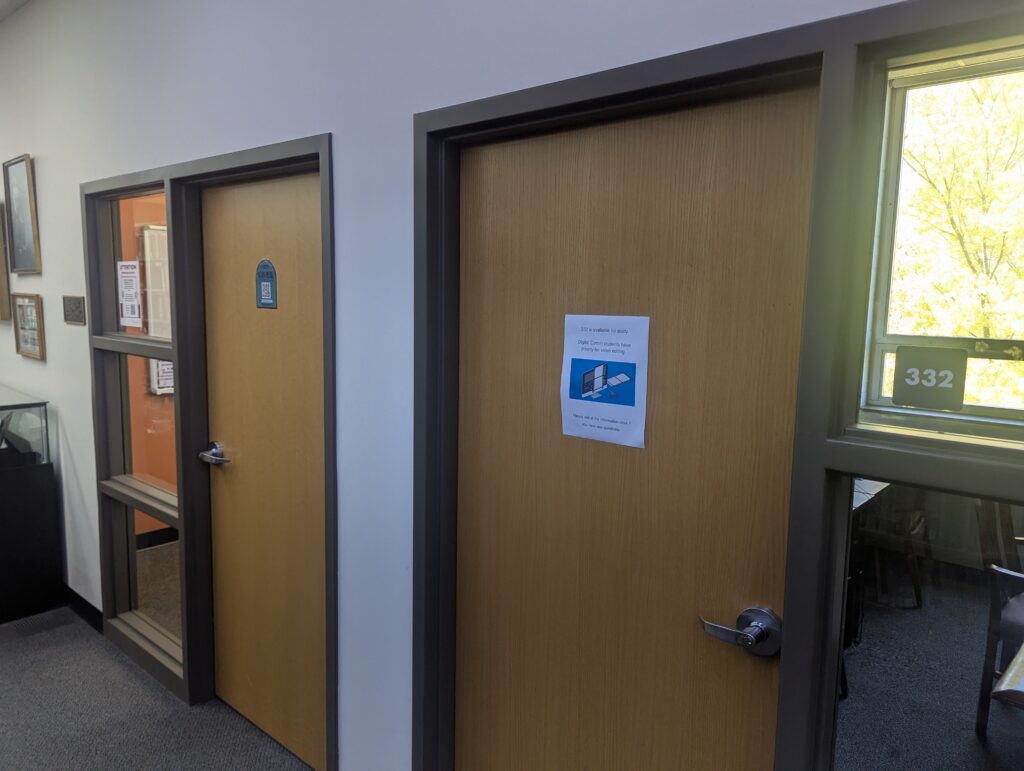“Do you guys hate us?” “[…] at this point the administration may as well take all the study rooms for offices.” “I guess I’ll just have to fights to the death to get a room… – unhappy student :(“
This is just a sampling of the unhappy graffiti left on a library notice sign, announcing that yet another study room (Room 328 on the second floor of the library) will be turned into an office. Without Room 328, Warner Library will only have four study rooms on the second floor that are available for students. This is a pretty serious problem, since library space is much needed, and has become progressively more and more limited as the school year goes on. Walled study rooms are especially important, because they are guaranteed to be private and quiet – unlike the rest of the library. The first floor in particular is not guaranteed to be a quiet study space – what with all the students coming in and out – especially in the middle of the day. The second floor is pretty crowded too.
I practically live in the library, so I definitely relate to the frustrated students who graffitied the poster. For example, during the first month of the semester, I had an online class on Tuesdays and Thursdays, 10 a.m. It’s pretty much impossible to find a study room on campus at that time. Moreover, it’s just impossible to find any empty study space on campus. My dorm room isn’t empty, my dorm’s lobby isn’t quiet, and, for goodness’ sake, the library isn’t empty or quiet either. At 10 a.m. on Tuesday, there just is not a private study space on Eastern’s campus. I ended up being late for pretty much every class because I was running around Warner, Walton and HHC, trying to find a semi-suitable space to do my required class. Schoolwork is literally why we are here at Eastern, but it feels like there’s no room to do it.
Why are we losing study rooms? Is there a solid justification for turning all our study rooms into offices? Due to all the construction and rearranging on campus, Eastern started using the library for office spaces at the end of last semester. Over the summer, the library was so overrun with administrative offices that there were no study rooms at all. Fortunately, by fall, administrators had been moved to the newly renovated Ott Hall, and Eastern retained five meagre study rooms (now four) and handed the remaining offices over to ARC.
ARC (Academic Resource Center) includes the Writing Center, Tutoring Center, the Disabilities Accommodations Testing Center and the Equal Opportunity Center (among other resources.) In some ways, a partnership between ARC and the library is ideal, since both centers seek to promote academic excellence and support students academically. Further, Eastern needs ARC for the essential assistance and resources it provides.
Ruby Baker, the Writing Center coordinator, explained that ARC had a hard time finding a space that was available and accessible. (Walton, where ARC was formerly located, does not have a working elevator.) Before ARC moved into the library, some students could only access ARC services virtually. Eastern, as aforementioned, just has a big space problem in general. There just is not another place for ARC to go. So, the study rooms take the hit.
“We apologize for any inconvenience,” reads the graffitied announcement. And the library staff and administrators do recognize the inconvenience of limited study rooms. “I’ve heard a lot from students that they’re unhappy,” said Kathy Hecht, Access Services Librarian at Warner Library. She said she’d heard students call the fight for a study room “a warzone.” Not only do the librarians realize that students are frustrated, they also acknowledge this frustration as legitimate. In the Warner Library Newsletter, Hecht noted the positive effect that library use has on student retention and GPA. Hecht’s article also references a survey of colleges that are a similar size to Eastern. All these colleges have a range of 9-26 study rooms. Compare that to Eastern’s four squished together study rooms.
“The librarians are actively advocating for students,” Hecht promised. “But students need to advocate for themselves.” She suggested reserving a study room if you know you will need one, and reminded students to be considerate and kind towards others.
Baker also affirmed that ARC is on the student’s side. “I am empathetic because, of course,” said Baker, speaking about the limited study rooms. She mentioned again and again her desire to support students and provide them with the best students. “In my ideal world,” said Baker, “something like the hub exists for us… to be an office meeting space” rather than the current crowded situation. (I met with Baker in her office, which she mentioned in passing, used to be a closet.) Baker agreed that students should have more study rooms, “but also ARC is providing good services more accessible. It’s a two sided coin,” she concluded.
It is a tough situation, and difficult to find a solution. But that does not mean that we should stop talking about it. Many administrators at Eastern (like the staff at the library and ARC) really do care about students’ experiences. We might have to get creative with the use of space (that is, even more creative. After all, we’re already filling up the closets.) It might take time to reach an ideal solution. Still, we as a student body should keep calling for the services we need to reach our academic potential.

